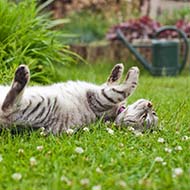
Nicky Trevorrow offers ideas and inspiration at BVNA Congress.
“It's not likely to be cats causing the major declines in our bird populations,” noted Cats Protection's behaviour manager Nicky Trevorrow, speaking at BVNA Congress on Saturday (2 October).
When it comes to cats and predation, “cats are being used to deflect the real issues of habitat loss and pesticide use," she said.
Continuing on BVNA’s 2021 Congress theme of sustainability, Nicky's passionate and insightful lecture offered practical tips for creating an outdoor space that is both cat friendly and wildlife-friendly. The session also provided some advice on feeling confident when advising owners on putting wildlife gardening into practice.
On the principles of wildlife gardening, Nicky quoted the adage: “if you build it, they will come" - adding that this could not be more true than when encouraging wildlife into your garden. According to the RSPB, gardens provide a really important breeding habitat for house sparrows, starlings, greenfinches and blackbirds, all of which are currently in decline.
Nicky began the session by sharing some ideas and inspiration for cat-friendly gardens – from planting trees and shrubs for shade to lawn areas for interactive games. She also highlighted the importance of giving cats somewhere to hide, adding that this is something many owners do not provide.
Commenting on the design of a cat-friendly garden, Nicky suggested the addition of elevated spaces that allow resident cats to view their territory from above - be that planting extra trees or perhaps creating a balcony. She also suggested installing railway sleepers or wooden posts, which are not only fun for cats but give them somewhere specific to mark their scent.
After setting out some of the common garden hazards faced by cats, including lilies and pesticides, Nicky shared some tips on creating a garden that is both fun for cats and attractive to wildlife. Among them include:
- creating a cat-friendly garden with height - having a solid wall behind elevated spots provides the cat with safety.
- planting buddleia, catmint or other perennials. To prevent felines from damaging young catmint plants, cover the plant with a mesh hanging basket and allow the plant to grow through it.
- building a small pond or fill a tub with water - research by the RSPB found that creating a pond is one of the best ways to encourage nature to your garden. Cats also love to drink from ponds!
- avoiding pesticides in the garden. Don't use harmful pesticides such as slug bait. Leave it to nature (hedgehogs) to control garden pests instead.
- promoting fishing rod toy play. A recent study by the University of Exeter found that owners that play with their cats for 5-10 minutes a day using a fishing rod toy can reduce predation by 25 per cent.
Nicky concluded the session by looking at the future of cats and predation, adding that neutering (from the age of four months) is one of the best ways to control the UK's cat population.



 The latest
The latest